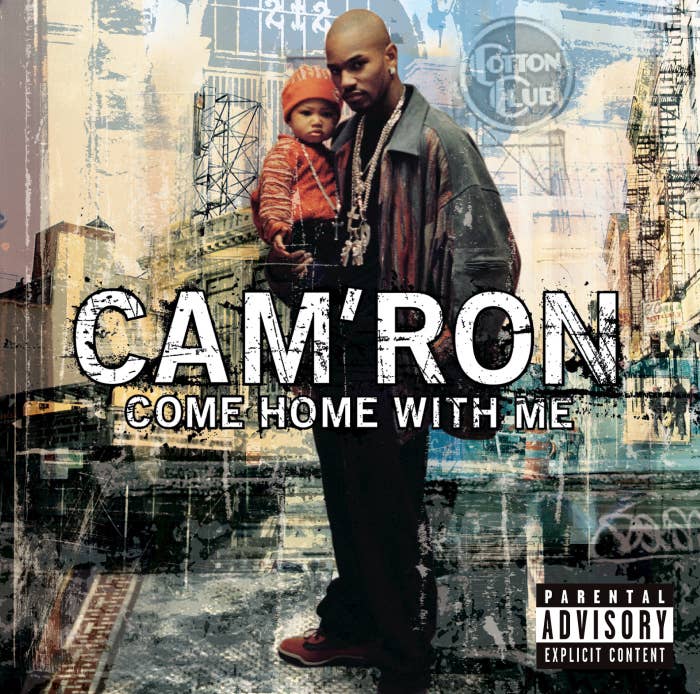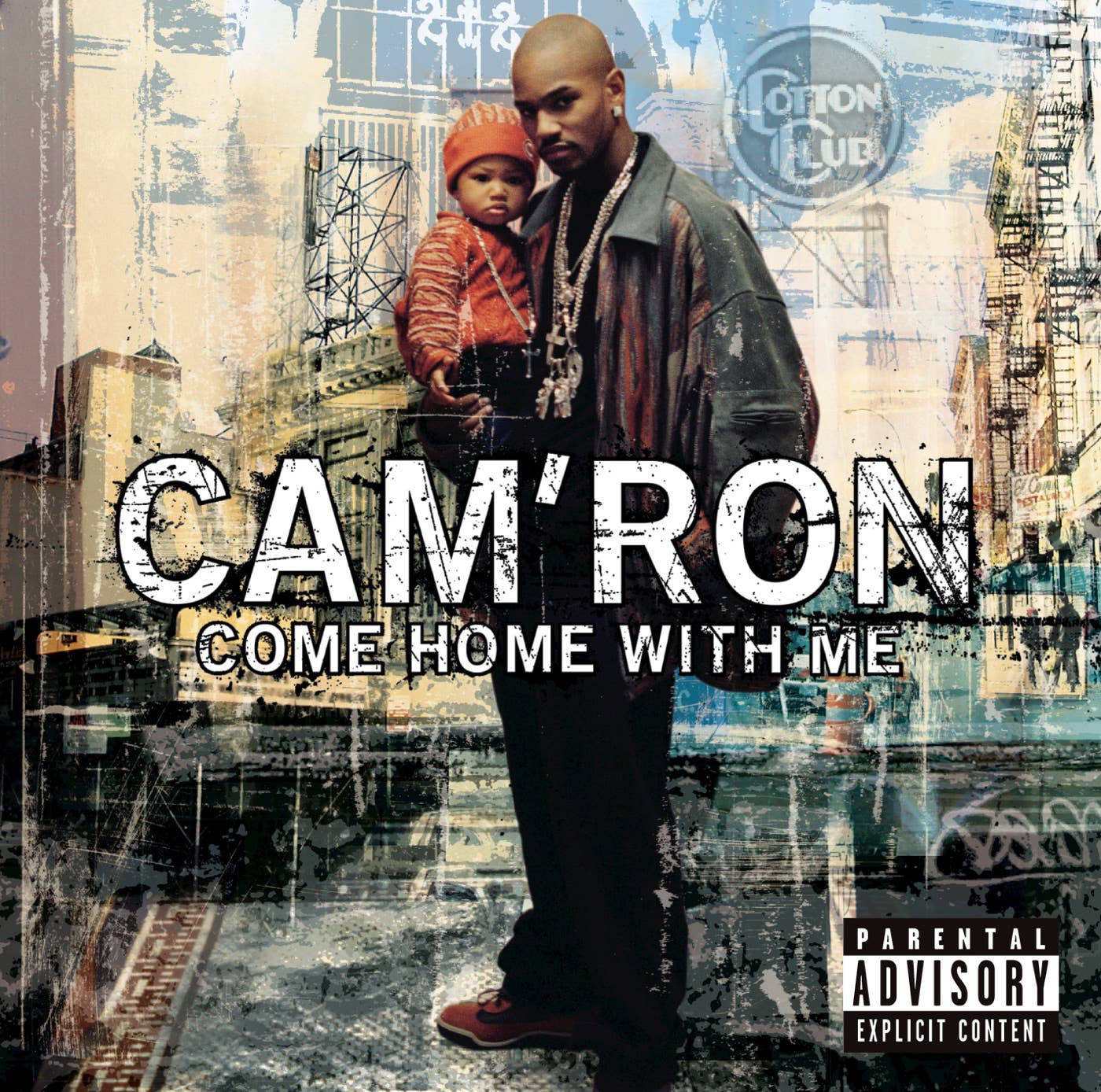
When Cam’ron signed to Roc-A-Fella Records in 2001, his good friend (and Roc co-founder) Dame Dash told him that if his next solo album didn’t work out commercially, he could always have a job “answering phones or something” in the Roc-A-Fella office. We can all thank the rap gods that Come Home With Me, which arrived 20 years ago today, was successful, and Cam’ron isn’t known as the brashest secretary of all time.
The 15-track project is a quintessential time capsule of 2000s rap. It displayed the breadth of Cam’s talents, not just as a lyricist and hitmaker, but as a bonafide leader of a movement. Cam linked with Kanye West, Just Blaze, Ty Fyffe, and Rsonist of the Heatmakerz to craft what became the Dipset sound, alternating chipmunk soul records like “Oh Boy” and laidback samples on songs like “Daydreaming” with urgent ones like “Come Home With Me,” his collaboration with Jay-Z. Cam’s mesh of supreme technical lyricism, charisma, hilarity, and storytelling blended perfectly over the soundscape, solidifying both his and Dipset’s presence as a pillar of New York rap.
The effort Cam’ron put into Come Home With Me was a consequence of him being at a major fork in the road at the start of the 2000s. His previous two Epic Records albums, Confessions Of Fire and S.D.E, had modest success, but he was so unhappy with the label that he demanded his release without a fallback plan. He’s admitted that he was dead broke during that period, recalling a story of randomly getting a $10,000 check, losing it in front of Baseline Studios, and frantically looking for it (he found it underneath a nearby car). But he needed more checks.
Enter Roc-A-Fella, the towering movement co-led by his fellow Harlemite and longtime friend Dame Dash. Cam’ron has said that the two men had some kind of discrepancy at the time, but Dame overlooked it and gave Cam a second chance in the industry. Not only were they friends, Cam’ron was one of the most talented lyricists in New York City at the time. He came up sharpening his bars alongside Big L, Mase, and his cousin Bloodshed in Children of the Corn. After the unfortunate murder of Big L a week before he was set to sign to the Roc, it may have been an even bigger priority for Dame to sign a Harlem MC.
View this video on YouTube
Cam’ron immediately got to work, collaborating with in-house Roc producers Kanye West and Just Blaze, as well as other local New York producers. He had forced his way off Epic, and carried some of that forcefulness into his Roc stint, literally taking the beat for “Oh Boy” from Just Blaze. He told Nardwuar that Juelz encouraged him to take Just Blaze’s beat CD out of the studio and rap over whatever beats he liked. “Oh Boy,” originally made for Memphis Bleek, was on the tape, and Cam’ron decided to take the Mary J. Blige sample and put Juelz on it, too. Just Blaze was understandably mad, but the song ended up becoming a hit. None of Cam’ron’s previous singles had sounded like “Oh Boy.” It was sleek and catchy, riding the right blend of soulfulness and playfulness to work as a radio hit. Cam and Juelz took turns bouncing off the “boy” vocal sample, setting a tone for the rest of the album.
The most notable progression of Cam’ron’s sound from S.D.E. to Come Home With Me was his delivery. On his first two projects, he rapped with a more animated style that was typified by “Horse & Carriage” from Confessions of Fire and S.D.E.’s “Losin Weight” with the late Prodigy. Come Home With Me is the first album where he slowed his flow down, confident that his wit, storytelling ability, and assonant technical style would allow him to shine enough without the vocal theatrics. It was a polarizing decision, as the deliberate cadence he’s become known for is easy for fans to parody or deride as a lazy flow, but there’s none of that on Come Home With Me.
If Cam’ron taking “Oh Boy” wasn’t enough gall, he decided to rap over a remake of Tupac’s “Ambitionz Az A Ridah” on “Leave Me Alone.” Rhyming on an iconic beat from a rap GOAT could have backfired mightily, but Cam showed out from the opening bars: “Soon as I get here niggas wanna wrap the Roc up/ Nah, bag, slab, wrap the rocks up, gats, back the block up/ Cop killers, clap at coppers, blast at choppers/ Pass the vodka.” It’s no wonder Biggie wanted to sign him shortly before his passing—the two excelled at packing simple words into intricate rhyme patterns, showing off their lyricism while staying as accessible as possible.
View this video on YouTube
“Welcome To New York City” is a bar for bar slugfest with a firmly-in-his-prime Jay-Z. It would have easily gotten most other rappers out of the paint with bars like, “I’m a BK brawler, Marcy projects hallway loiterer/ Pure coke copper, get your order up,” but Cam held his own, rhyming, “Carry eight guns, two in the trunk, two on the waist, two on the ankle, two to just spank you.” During the third verse, when they’re interchanging their bars, Styles and Kiss style, you’re time-portaled to the moment, however fleeting, where Cam was one of the best rappers in the entire world. His most beloved attribute is the comical menace felt on “The Roc (Just Fire),” which stands near the top of the Roc-A-Fella collaboration canon. After Beans and Bleek blare through their verses, Cam rolls in with an aura as if he was trying to son God himself. “Go ‘head stupid niggas, go fuck with them chicks/ I’m the third little piggy, I’ma fuck with them bricks,” he raps. And that was before his infamous “...in front of housing” bars.
Come Home With Me is also notable as the birth of Dipset as we know it. The group had been in effect since 1997, but the title track is their coming-out party. Cam’ron takes us to Harlemworld U.S.A., in the “early ‘90s” where “it wasn’t pearly and shiny, I was certainly grimy.” His storytelling is on full tilt here, stacking up multis while building on his life and times: 60 packs, his bat wielding mom, mayonnaise, toast and pepper dinners, and dice games where “Jones loaned 60/ Head cracks thrown swiftly, took it home with me.” Juelz follows up with his own treatise on Harlem “where these kids need food/ Niggas need guidance and bitches need rules.” Juelz and Jim rap with the conviction of pastors. For all of the rightful characterization of Dipset as the epitome of swagger, they’re most compelling when they’re locked in and rapping with force.
Juelz is the co-star of the album, following up Cam’ron’s “Losing Weight. Pt. 2” pyrex parable with an accompanying verse that takes you into their plight so well you forget he raps “fire” with “fire” twice. If Cam had rapped just his verse, it would have been a strong track, but Juelz made “Losing Weight. Pt. 2” a saga, and he delivers one of the most fun-to-recite verses of the 2000s on “Hey Ma.” His abrupt pivot from playful lothario to “get in the car, and don’t touch nothing, sit in the car” is brilliant comedic timing, which cued to the stardom he’d achieve on his own in the 2000s. It’s a testament to Cam’s unselfishness and foresight that he was focused on catapulting Juelz’s career during a time when his own was on the line.
The decision paid off. Come Home With Me is platinum-certified and peaked at No. 1 on the Billboard 200. “Oh Boy” was at the top of the Hot R&B/Hip-Hop Singles for five weeks and “Hey Ma” peaked at number three on the Hot 100. Those songs, as well as the title track, “Welcome To New York City,” and “Just Fire” are entrenched in the New York rap canon and ring off during any New York rap mix. The success of CHWM led to Diplomat Records being signed to Roc-A-Fella records.
After the album, Cam revolutionized the mixtape game by rolling out the Diplomats Volume series, the first mixtapes not hosted by a DJ, but by a crew. The late DJ Kay Slay talked his shit over some of the records, but they were Diplomats branded mixtapes. The buzz from those mixtapes, as well as their Diplomatic Immunity album, helped Juelz get signed to Def Jam, Jim Jones strike a deal with Koch, and solidified rappers like JR Writer, Hell Rell, and 40 Cal as New York rap staples. But all of that hinged on the success of Come Home With Me.
Cam’ron was domineering. He was hilarious. He was reflective, and laser-sharp lyrically. Beyond Jay-Z’s albums, Come Home With Me is the project that demonstrated the Roc-A-Fella formula at its zenith. While Kanye was amazing, he was an outlier of the crew. And while Beans is an incredible lyricist, his singles didn’t reach the heights of Cam’ron’s. Come Home With Me was the Roc’s quintessential early 2000s example of how to give a gritty, charismatic artist an album with mass appeal.



